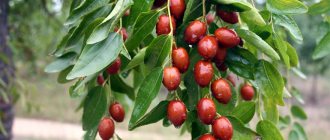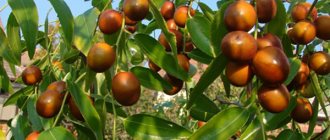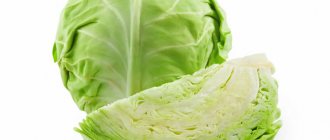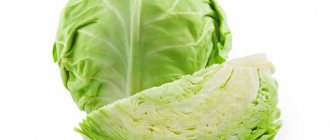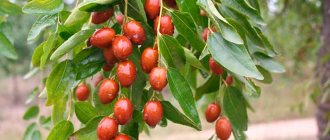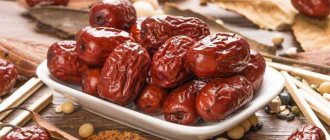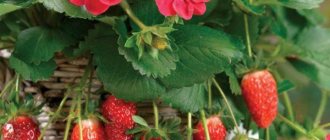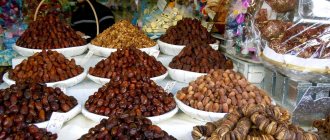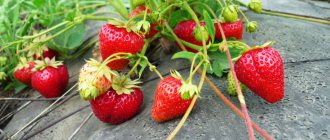The exotic name hides a close relative of the date. True, pickled jujube is prepared from unripe green fruits. Ripe berries are sweet - jam is made from them, dried and added to tea. Green pickled dates taste like olives.
Jujube contains a lot of vitamin C, is useful for cardiovascular diseases, its fruits are rich in proteins and carbohydrates. Interestingly, these southern berries do not lose their properties during heat treatment, so they can be poured with boiling water. The benefits of jujube are manifested not only in strengthening the immune system.
Try preparing this unusual dish and serving it as an appetizer-alternative to the usual olives. Jujube is stored in glass jars with a screw cap, like regular winter preparations.
Marinated jujube with olives
This recipe allows you to exactly replicate the taste of olives. In this case, you do not need the fruits of the olive tree at all.
Ingredients:
- 1 kg jujube;
- Bay leaf;
- peppercorns;
- garlic cloves;
- 50 gr. Sahara;
- 100 ml wine vinegar;
- 100 gr. salt;
- sunflower oil;
- 1 liter of water.
Preparation:
- Rinse the jujube well and let it dry completely.
- Place bay leaf, pepper and garlic on the bottom of each jar.
- Place jujube into jars.
- Pour water into a saucepan and bring to a boil. Fill the jars for 10 minutes. Pour the liquid back into the pan.
- Add salt, sugar and vinegar to the water. Heat the marinade without bringing to a boil.
- Pour into jars. Screw on the lids.
Beneficial features
If you take a closer look at the composition of jujube fruits, it becomes clear that the benefits from them are enormous, and the harm is minimal.
- The concentration of vitamin C in it is several times higher than in an orange or lemon, therefore, eating several sweet fruits for breakfast can significantly increase the body's resistance to colds.
- Doctors recommend including Chinese in the diet to prevent atherosclerosis, cardiovascular diseases and nervous system disorders.
- In oriental medicine, jujube is valued for its unique abilities - to rejuvenate the body, cleanse it of toxins, improve appetite and stimulate the gastrointestinal tract. Unabi is necessary for older people suffering from constipation. Thanks to fiber and pectins, the intestines are cleansed without stress, naturally.
- Jujube fruits are incredibly beneficial for the genitourinary system. This is an excellent diuretic that relieves swelling and inflammation in pyelonephritis and cystitis. To prevent sand and stones in the urinary canal, you should eat dates regularly.
To replenish the lack of iron in the body, there is no better remedy than jujube. A small amount of fruit, eaten several times a week, replenishes the norm of a valuable element. As a result, hemoglobin in the blood increases, the person’s symptoms of chronic fatigue disappear, and a good mood and energy appear.
Many people, especially in old age, develop joint diseases, bones become fragile and brittle. This is affected by a low percentage of calcium and phosphorus in the body. Jujube helps replenish deficiencies and normalize mineral content. This makes bone tissue stronger and improves joint mobility.
Pickled jujube stuffed with garlic
Another interesting snack option is Chinese figs with garlic cloves inside. The preparation is moderately spicy and aromatic.
Ingredients:
- jujube;
- garlic cloves;
- laurel;
- carnation;
- peppercorns;
- vinegar;
- sugar;
- salt.
Preparation:
- The quantity of all ingredients will depend on the number of jujube berries. See how many jars you can fill up to your shoulders; based on this, take wine vinegar at the rate of 100 ml per 1 liter of water.
- Rinse the berries and dry. Using a special device, remove the pulp from each berry.
- Place peeled garlic cloves into each jujube berry.
- Place bay leaves in jars - 3-4 leaves per jar, 6-7 peppercorns and cloves - 2-3 pieces. Place stuffed jujube in each jar.
- Prepare the marinade: for 1 liter of water you will need 100 g of salt and 50 g. Sahara. Boil it on the stove. Pour into jars. Leave for 20 minutes.
- Drain the liquid from the jars into a saucepan, bring to a boil, pour in wine vinegar. Boil for 2-3 minutes. Pour into jars, roll up the lids.
Delicious recipe!
What is vol-au-vent? The exotic name hides a close relative of the date. True, pickled jujube is prepared from unripe green fruits. Ripe berries are sweet - jam is made from them, dried and added to tea. Green pickled dates taste like olives.
Jujube contains a lot of vitamin C, is useful for cardiovascular diseases, its fruits are rich in proteins and carbohydrates. Interestingly, these southern berries do not lose their properties during heat treatment, so they can be poured with boiling water. The benefits of jujube are manifested not only in strengthening the immune system.
Try preparing this unusual dish and serving it as an appetizer-alternative to the usual olives. Jujube is stored in glass jars with a screw cap, like regular winter preparations.
Description
The medicinal plant gained popularity in ancient times. Its cultivation was widespread in Australia, Asian countries, the Mediterranean coast, Japan and China. Local residents ate the fruits and made medicinal tinctures and potions from them that helped get rid of health problems.
Today, the plant is cultivated in many eastern countries, as well as in Russia and the Caucasus. If you see a tree 5-10 meters high in the mountains, the branches of which are covered with thorns, do not hesitate - it is a jujube. At the beginning of summer, it blooms with pale green flowers, in place of which small ovoid fruits with smooth skin and fleshy contents soon appear. As they fill, they become light yellow, gradually turning into bright brown with a reddish tint.
There are many different varieties of jujube. Their fruits differ from each other in color and taste.
Marinated jujube with olives
This recipe allows you to exactly replicate the taste of olives. In this case, you do not need the fruits of the olive tree at all.
Ingredients:
- 1 kg jujube;
- Bay leaf;
- peppercorns;
- garlic cloves;
- 50 gr. Sahara;
- 100 ml wine vinegar;
- 100 gr. salt;
- sunflower oil;
- 1 liter of water.
Preparation:
- Rinse the jujube well and let it dry completely.
- Place bay leaf, pepper and garlic on the bottom of each jar.
- Place jujube into jars.
- Pour water into a saucepan and bring to a boil. Fill the jars for 10 minutes. Pour the liquid back into the pan.
- Add salt, sugar and vinegar to the water. Heat the marinade without bringing to a boil.
- Pour into jars. Screw on the lids.
Benefits and harms
Jujube is a valuable berry that contains a lot of useful nutrients and is a leader in the amount of vitamin C and iodine.
Attention! During storage, the amount of ascorbic acid in jujube fruits increases. Dried berries retain vitamins for 2 years.
Jujube berries are a unique dietary and medicinal product; their properties are almost as good as eleutherococcus and ginseng. Its use has:
Attention! In China, the fruits, seeds, roots and leaves of unabi are used to make dietary supplements.
In addition, the inclusion of unabi in the diet helps improve vision and weight loss, and in lactating women, increases lactation. Eating a few jujube fruits can easily get rid of a hangover.
Due to its anti-inflammatory and analgesic effect, decoctions and infusions of jujube leaves are used in the treatment of diseases of the gums and throat, purulent wounds, burns and dermatitis.
Unabi berries have anti-inflammatory properties
Contraindications to the use of jujube are individual intolerance to the product, the presence of hypotension. It should be used with caution during pregnancy.
Pickled jujube stuffed with garlic
Another interesting snack option is Chinese figs with garlic cloves inside. The preparation is moderately spicy and aromatic.
Ingredients:
- jujube;
- garlic cloves;
- laurel;
- carnation;
- peppercorns;
- vinegar;
- sugar;
- salt.
Delicious recipe! Salad with chicken and champignons recipe
Preparation:
- The quantity of all ingredients will depend on the number of jujube berries. See how many jars you can fill up to your shoulders; based on this, take wine vinegar at the rate of 100 ml per 1 liter of water.
- Rinse the berries and dry. Using a special device, remove the pulp from each berry.
- Place peeled garlic cloves into each jujube berry.
- Place bay leaves in jars - 3-4 leaves per jar, 6-7 peppercorns and cloves - 2-3 pieces. Place stuffed jujube in each jar.
- Prepare the marinade: for 1 liter of water you will need 100 g of salt and 50 g. Sahara. Boil it on the stove. Pour into jars. Leave for 20 minutes.
- Drain the liquid from the jars into a saucepan, bring to a boil, pour in wine vinegar. Boil for 2-3 minutes. Pour into jars, roll up the lids.
Jujube, the recipes for which are not only varied but also healthy, tops the ranking of medicinal plants in the world. Wine, preserves, jams, candied fruits, compotes are prepared from jujube fruits, and used in the form of winter pickled and dried preparations. Let's consider options for preparing this exotic plant at home.
Canned jujube - recipe
The original method of preparation is jujube stuffed with garlic in a marinade. This preparation can be used as an independent snack, and also serve as an excellent addition to a hot meat dish.
- jujube fruits - 1.9 kg;
- apple cider vinegar - 180 ml;
- bay leaf - 10 g;
- black peppercorns - 5 g;
- garlic - 15 g;
- salt - 50 g;
- sugar - 15 g;
- water - 1.2 l;
- vegetable oil - 90 ml.
- Wash the unripe, green jujube fruits and let dry.
- Peeled garlic, separate into cloves and place on the bottom of a sterile container along with pepper and bay leaf. Place the jujube fruits on top as tightly as possible, then cover them with a bay leaf and a clove of garlic.
- Heat the water without bringing it to a boil, so as not to damage the fruit when pouring. Add sugar, salt and vinegar, simmer for a few minutes until the ingredients are completely dissolved.
- Pour marinade over the fruits and then vegetable oil, which will increase the shelf life of the product. Close the container with a sterile lid and store in a cool place for long-term storage.
Delicious recipe! Useful properties of pumpkin and cooking features
Jujube - recipe for candied fruits
Preserving jujube fruits in the form of sweet candied fruits is a great way to replenish your vitamin supply in the winter. It is known that sweet preparations prepared in this way retain useful and nutrient substances all year round without changing their properties.
- jujube fruits - 950 g;
- sugar - 750 g;
- citric acid - 5 g;
- water - 650 ml.
- Wash the jujube fruits, dry them and pierce them in some places with a wooden skewer.
- Prepare a syrup from water and sugar by boiling these ingredients for a few minutes.
- Place the fruits in the syrup and cook them for a quarter of an hour, stirring occasionally. Remove the workpiece from the stove and let it sit for a couple of hours, then repeat the procedure again, adding citric acid.
- Place the cooked fruits in a sieve to remove excess syrup.
- Place the finished fruits on a flat and clean surface to dry completely at room temperature.
- Transfer the prepared candied jujube into a glass container and store in a cool, dry place.
Dried jujube compote - recipe
Dried jujube fruits are most often used in recipes for vitamin compotes and tinctures. Jujube involves simple preparation that does not require special culinary skills from lovers of healthy foods. Consider a quick recipe for a drink made from jujube and honey.
- jujube fruits - 900 g;
- water - 2.9 l;
- honey - 50 ml.
- Pour water over the prepared jujube fruits and boil for half an hour until completely softened.
- Squeeze the finished fruits and cook the resulting liquid until thick.
- Add honey to the finished drink and pour into glass containers. When using, dilute with water.
Jujube jam - recipe
- jujube fruits - 800 g;
- sugar - 800 g;
- water - 400 ml;
- citric acid - 10 g.
- Wash the jujube fruits, dry them and prick each berry with a fork.
- Add sugar and citric acid to boiling water, cook a little and pour sweet syrup over the prepared fruits.
- Keep the berries in the syrup for several hours, then cook for half an hour, stirring.
- Pour the finished jam into sterile jars and close with sterile lids.
Did you like the recipe? Share with friends: VK
Chemical composition
In the east, jujube is respectfully called the tree of paradise. He truly deserved this name. All parts of the plant have healing properties, although most of the beneficial elements are found in the fruits. In their chemical composition you can find:
- set of organic acids;
- amino acids and alkaloids;
- oleanolic acid;
- betulinic acid;
- flavonoids and styrenes;
- glucose;
- and essential oils.
Jujube contains a high percentage of vitamins C, PP, group B and microelements.
The calorie content of fresh jujube fruits is relatively small - 80 kcal per 100 g. In dried form, it increases significantly and reaches 250 kcal.
Interesting fact
The leaves of the Chinese date contain an anesthetic. Therefore, if you chew them for several minutes, the taste buds turn off, and the person stops feeling the sweetness of the food, although he still feels the acid and salt.
Jujube bark is widely used by traditional healers. An infusion of it relieves inflammation, lowers cholesterol, tones, and has an astringent effect.
Contraindications and harm
Of course, like many useful products, there are also contraindications for jujube. So, the fruits of the plant can be harmful if you use it incorrectly. It is best to use jujube for brewing decoctions and teas. Make sure there are no individual intolerances.
Jujube fruits are not recommended for people suffering from hypertension. This does not mean that they should not be consumed at all, but when taking them, you should monitor your blood pressure. Also, jujube contraindications exist for certain groups of people.
Unabi berries - photo
The unabi (jujube) or Chinese date is sometimes mistakenly compared to the real date due to its external resemblance, but the former, unlike the latter, is the fruit of a shrub rather than a palm tree. And they have different tastes and beneficial properties. Unabi appeared on the domestic market not long ago and has only been gaining popularity since then, because it has an excellent taste and is incredibly healthy. We bring to your attention detailed information about the plant: properties, benefits and contraindications, reviews, as well as recipes on how to prepare this plant.
